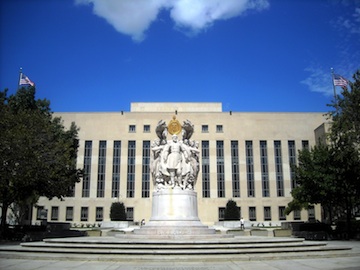FCC: Stay of Orders Could Affect Deal Outcomes
The smarter way to stay on top of the multichannel video marketplace. Sign up below.
You are now subscribed
Your newsletter sign-up was successful

WASHINGTON -- The Federal Communications Commission told a federal court Monday that granting a stay of its decision to allow third-party vetting of contract documents by programmers could not only delay a decision on the Comcast-Time Warner Cable and AT&T-DirecTV deals beyond a current "early spring" timetable for completion, but could affect whether those mergers are approved or denied.
"Staying the order pending appeal will materially disrupt the current schedule for the commission’s expeditious review and resolution of the proposed mergers, and by itself, could impact the outcome of these applications," FCC general counsel Jonathan Sallet said to the U.S Court of Appeals for the D.C. Circuit.
Sallet said the modified protections of competitively sensitive merger documents it wants to make available to hundreds of outside parties are robust, while allowing those parties to "participate effectively" in the reviews of a pair of major media mergers.
Thousands, perhaps millions of documents have been filed in the merger applications of both the Comcast-Time Warner Cable and AT&T-DirecTV mergers, including such material as contracts, emails and memos related to retransmission-consent and programming agreements.
The FCC was responding to a petition to the D.C. circuit from CBS, 21st Century Fox and other content providers for a stay of the 3 p.m. deadline Monday (Nov. 17) by which it had planned to make those documents available under protective orders modified by the FCC's Media Bureau and approved by the full commission in a party-line vote last week.
The court Friday stayed the 3 p.m. deadline on its own motion -- rather than in response to the programmers’ stay request -- saying it needed more input from both parties on that stay request. It gave the FCC until noon today to make its argument against the stay, and programmers until Wednesday to make their arguments for it.
The FCC said its decision was an "eminently reasonable exercise of its broad discretion to dictate the procedures for its review of the two mergers," including participation by third parties, and said it would help insure the transactions are in the public interest.
The smarter way to stay on top of the multichannel video marketplace. Sign up below.
It said the petitioners -- CBS, Fox, et al -- had failed to demonstrate a likelihood of success on the merits and would not suffer irreparable harm without it, the two threshold tests for granting such emergency stays.
Contributing editor John Eggerton has been an editor and/or writer on media regulation, legislation and policy for over four decades, including covering the FCC, FTC, Congress, the major media trade associations, and the federal courts. In addition to Multichannel News and Broadcasting + Cable, his work has appeared in Radio World, TV Technology, TV Fax, This Week in Consumer Electronics, Variety and the Encyclopedia Britannica.

